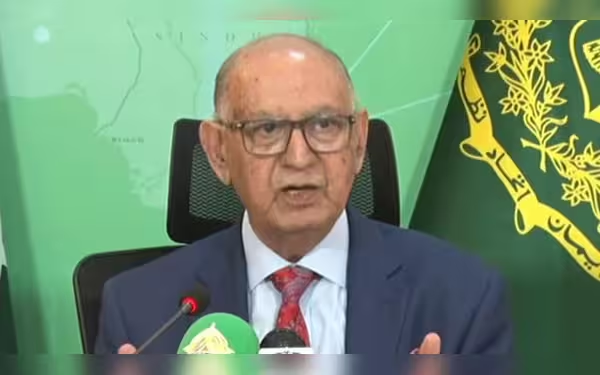Saturday, November 16, 2024 07:24 PM
PML-N Leader Asserts Parliamentary Amendments Beyond Judicial Challenge
- PML-N leader questions judiciary's role in legislative matters.
- Supreme Court ruling allows PTI to claim reserved seats.
- Concerns grow over judiciary's influence on governance.
 Image Credits: thenews.com.pk
Image Credits: thenews.com.pkPML-N leader claims parliamentary amendments cannot be challenged in court, raising concerns over judiciary's influence in Pakistan's governance.
In a recent press conference, a prominent leader from the Pakistan Muslim League-Nawaz (PML-N) made a bold statement regarding the relationship between the judiciary and parliamentary amendments. The senator emphasized that the constitution is the foundation that created the judiciary, asserting that it is not the other way around. This statement comes in light of a significant judgment delivered by the Supreme Court on September 23, which declared the former ruling party eligible for reserved seats in the assemblies.
The senator's remarks were directed at the judiciary's role in interpreting laws and the constitution. He questioned the validity of the Supreme Court's ruling, which was detailed in a 70-page document. In this judgment, the apex court recognized the Pakistan Tehreek-e-Insaf (PTI) as a legitimate political party, thus allowing it to claim its share of reserved seats in the assemblies. This decision has stirred considerable debate among political circles, with many viewing it as a pivotal moment in Pakistan's political landscape.
By stating that parliamentary amendments cannot be challenged in any court, the PML-N leader is highlighting a crucial aspect of the separation of powers in governance. This principle is designed to ensure that the legislative branch can operate independently without undue interference from the judiciary. The senator's comments reflect a growing concern among political leaders about the judiciary's increasing influence over legislative matters.
As the political climate in Pakistan continues to evolve, the implications of this judgment and the senator's statements will likely resonate throughout the country. It raises important questions about the balance of power among the branches of government and the role of the judiciary in shaping political outcomes. Citizens and political analysts alike will be watching closely to see how these developments unfold and what they mean for the future of democracy in Pakistan.
The ongoing dialogue about the judiciary's role in legislative matters is vital for the health of Pakistan's democracy. As citizens, it is essential to stay informed and engaged with these discussions, as they directly impact the governance and political stability of the nation. The relationship between the judiciary and the legislature is not just a legal matter; it is a reflection of the values and principles that underpin the very fabric of society.













